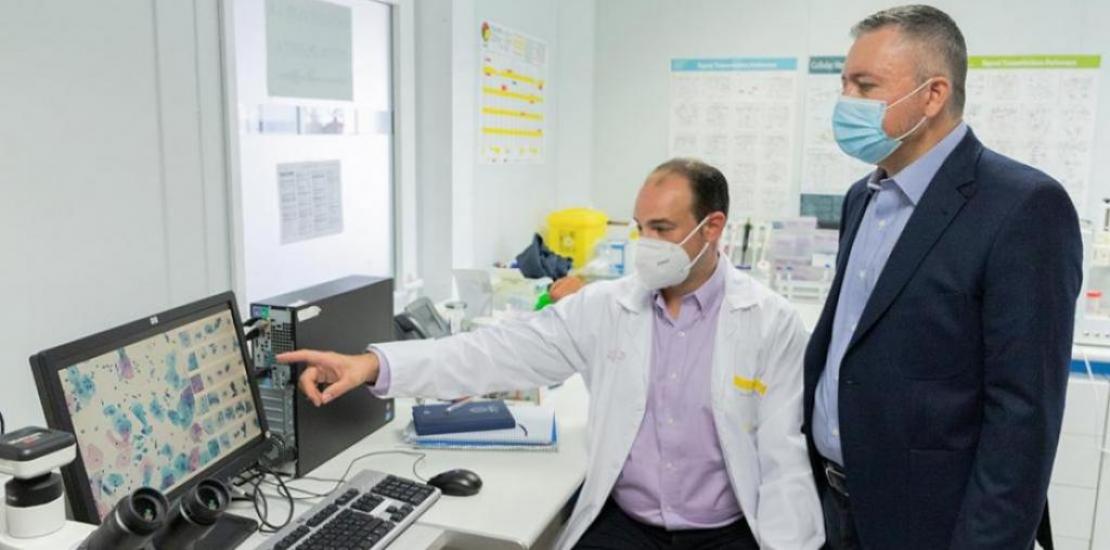The research aimed at accelerating early diagnosis of cervical cancer is open to citizen collaboration
Through an economic contribution or by disseminating the project it is possible to collaborate to this research, included in the FECYT Precipita platform (Spanish Ministry of Science and Innovation), which aims at developing a screening system through artificial intelligence that would reduce by 85% the pathologist’s workload, thus allowing to implement a population programme of early diagnosis. It is developed by researchers of UCAM Universidad Católica San Antonio de Murcia, the Polytechnic University of Valencia, the CIAGO Gynaecological Clinic of Torre Pacheco and the Santa Lucía and Santa María del Rosell university hospitals of Cartagena.
Cervical cancer is one of the most incapacitating ones; it is caused by the appearance and growth of tumour cells in the cervix, mostly due to the human papillomavirus (HPV) infection, which is generally sexually transmitted. It is the fourth most frequent tumour among women and it is the predominant tumour in 28 developing countries where, furthermore, it is the leading cause of cancer mortality among women, even ahead of breast cancer. Its incidence in Spain is of 6.3 cases per 100,000 women per year.
Its early detection is possible through the study of Pap smears. Nevertheless, in Spain there is no early population diagnosis programme studying the entire female population, due to the large volume of samples to be analysed. If there were one, it would allow to start the treatment earlier, thus reducing this cancer's sequelae and mortality rate.
The project ‘Inteligencia artificial para el diagnóstico precoz del cáncer de cérvix’ [Artificial intelligence for the early diagnosis of cervical cancer] aims at developing a Medical Diagnosis Aid System to locate cells that present pathological changes. The main advantage is that it would be possible to analyse a large volume of Pap smears automatically, identifying the pathological samples. This would entail a reduction of around 85% in the workload, as opposed to classic sample review. It would be a useful tool to propose population screening strategies, allowing to reduce the incidence of this cancer and its early detection in its early phases, with less sequelae for the patients.
The team of researchers is led by Andrés Bueno Crespo, teacher and researcher of the Bachelor’s Degree in Computer Science Engineering of UCAM, and José Martínez Más, gynaecologist and director of the Comprehensive Gynaecology and Obstetrics Care Centre of Torre Pacheco (Murcia). Andrés Bueno highlights the significant amount of time saved with this system: “It will be extremely useful for the pathologist, because the algorithm will allow him/her to focus on the most problematic Pap smears and, by indicating the region of interest, the pathologist will be able to go directly to the area where there might be a possible tumour cell. While the pathologist studies one Pap smear, the artificial intelligence analyses hundreds of them”.
José Martínez Más highlights the importance of early detection, which would be made possible by the development of this application: “If we are able to detect the initial lesions, we can carry out a minimally invasive treatment and with no sequelae for the patient. If it is not detected early, the lesion will evolve and develop a cancer that may cost the patient’s life, or that may be treated through radical surgeries causing the inability to conceive or serious sequelae in terms of side effects of local radiotherapies”. This cancer “is increasingly affecting younger women since, although the average age is of 48, the detection rate is increasing in the 30-35 age group”.
How to participate?
The research has already begun and it is possible to collaborate on precipita.es, a citizens participation platform implemented by the Spanish Foundation for Science and Technology, which is a part of the Spanish Ministry of Science and Innovation. Contributions of less than 150 euro are 80% tax deductible, which will be automatically reflected in the subsequent year's tax return.
Visit the webpage https://www.precipita.es/proyectos/INTELIGENCIA-ARTIFICIAL-PARA-LA-DETECCION-PRECOZ-DEL-CANCER-DE-CERVIX and follow the specified steps in order to join this project.




